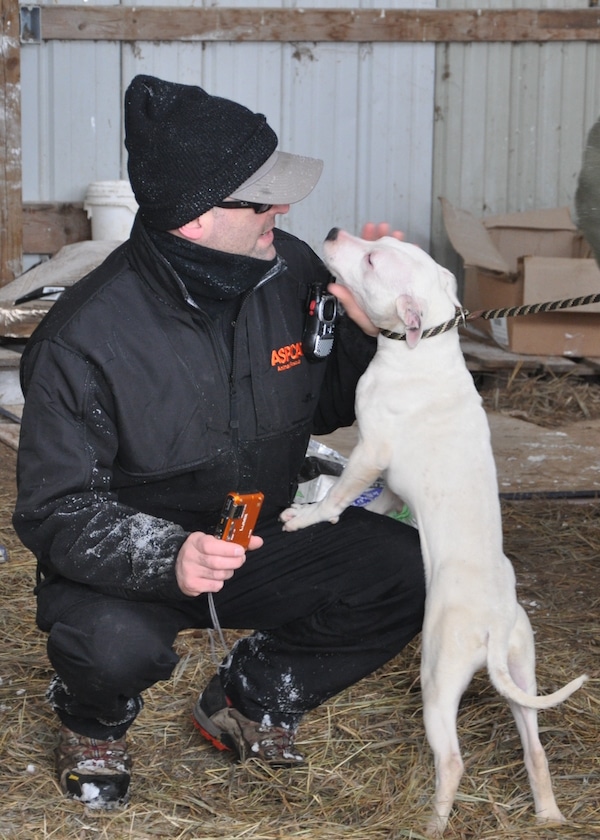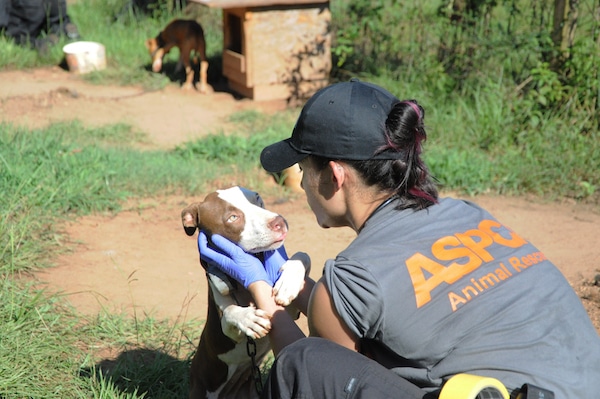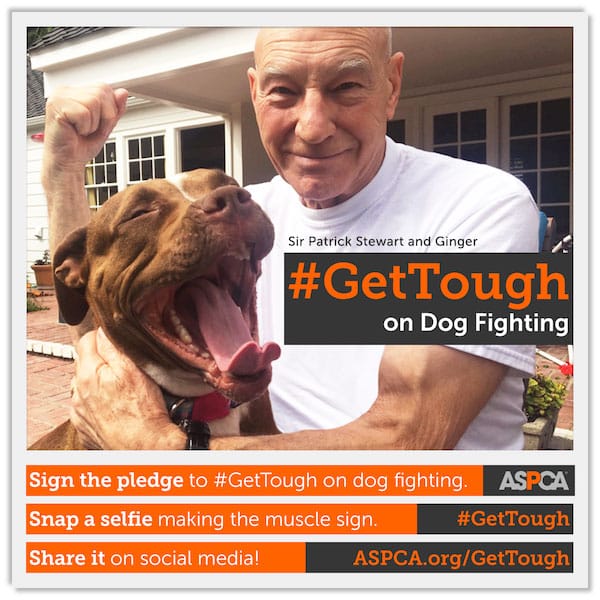Just last December, the ASPCA assisted federal authorities in removing and sheltering over 150 dogs as part of an alleged dog fighting operation in eastern North Carolina that resulted in the arrest of 10 men. It’s a frightening and tragic reminder of how prevalent dog fighting is in America today, and a further reason why we observe Saturday, April 8, as National Dog Fighting Awareness Day.
Even though dog fighting is a felony in all 50 states, the “blood sport” persists in many places. In the last eight years, we’ve assisted law enforcement on over a hundred dog fighting cases, have come to the rescue of more than 3,600 dogs, and have helped prosecutors file 787 criminal charges related to dog fighting. Last year alone, the ASPCA deployed to eight states and rescued nearly 350 dogs from dog fighting cases.

ASPCA President and CEO Matt Bershadker on location at a dog fighting raid in Missouri. (Photo courtesy ASPCA)
By our estimate, there are still tens of thousands of dog fighters in the U.S., forcing hundreds of thousands of dogs to brutally train, fight and suffer every year. Losing dogs are often killed, sometimes by shooting, electrocution or drowning.
These animals fight in urban, suburban and rural settings in all regions of the country. And dog fighters and individuals who attend these events are just as varied. Lawyers, judges, teachers, high school coaches and veterinary technicians have all been arrested in connection with dog fighting.

ASPCA raid of dog fighting ring. (Photo courtesy of ASPCA)
With this level of depravity, it’s not enough to see dog fighting as simply a criminal act. Dog fighting is a deep stain on our national character, a cultural embarrassment we should all feel and want to do something about. But even if you don’t know any dog fights or fighters, there’s still a lot you can do:
- Join Patrick Stewart in speaking out against dog fighting using the hashtag #GetTough.
- Visit aspca.org/gettough and share the information with friends, family and colleagues.
- Help end the life-threatening stereotyping of particular breeds – often pit bulls – by fighting breed-specific regulations and prohibitions and by fostering formerly abused animals where and when you can.
- Notify local authorities if you hear or see anything that makes you suspect animal fighting or the training of animals to fight. Public tips are often the first step in life-saving investigations that uncover not only animal abuse, but related crimes like illegal drug and firearm sales.

Patrick Stewart and his foster dog, Ginger, are part of the ASPCA’s #GetTough campaign. (Photo courtesy ASPCA)
Dog fighting is not rare nor a relic from our past, so the effort to eradicate it must be committed and constant. Whether that work takes place at the scene of the crime, in our laws or on our social networks, it all starts with a decision to #GetTough.
About the author: Matthew Bershadker was named President and CEO of the ASPCA® (American Society for the Prevention of Cruelty to Animals®) in June 2013. A lifelong animal lover, he joined the nation’s first animal welfare organization in 2001, serving most recently as senior vice president of the ASPCA Anti-Cruelty Group (ACG), the division responsible for confronting animal cruelty and suffering across the country. Before joining the ASPCA, Bershadker worked for organizations including Share Our Strength (SOS) and the Rape Abuse Incest National Network (RAINN).
The post We Need to #GetTough on Dog Fighting — Here’s How appeared first on Dogster.
No comments:
Post a Comment